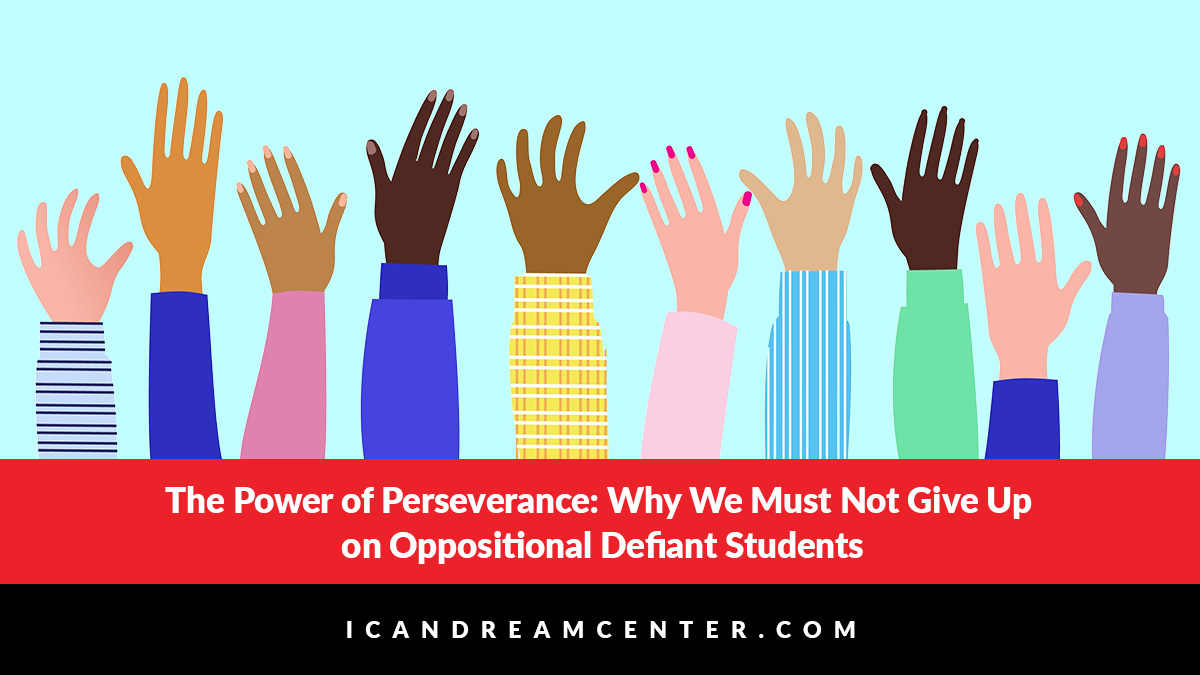
The Power of Perseverance: Why We Must Not Give Up on Oppositional Defiant Students
In the bustling halls of schools across the country, teachers and administrators face a myriad of challenges, each unique and demanding. Among the most trying of these challenges is working with students who exhibit oppositional defiant
behaviors. These students, often misunderstood, can be seen as disruptive or uncooperative, leading some to view them as “problem children.” However, it is crucial to recognize the profound importance of not giving up on these students, as their futures—and
the very essence of our educational system—depend on our collective perseverance and understanding.
Understanding Oppositional Defiant Disorder (ODD)
Oppositional Defiant Disorder (ODD) is a behavioral condition characterized by a consistent pattern of angry, irritable moods, argumentative behavior, and defiance toward authority figures. These behaviors can make the classroom environment
challenging for both teachers and other students. However, what often goes unnoticed is that these behaviors are not a choice but a manifestation of deeper emotional and psychological struggles. These children may be dealing with issues such as anxiety, depression,
or trauma, all of which can exacerbate their defiant behaviors.
The Role of Educators and Caregivers
For educators and caregivers, working with an oppositional defiant student can be exhausting and frustrating. The temptation to label these students as “lost causes” or to disengage entirely can be strong. However, it is precisely in these
moments that the role of the educator becomes most critical. Giving up on these students not only diminishes their potential but also undermines the fundamental mission of education: to nurture and guide all children, regardless of their challenges, toward
a brighter future.
Educators must adopt a compassionate, patient approach, understanding that change is often slow and progress incremental. Building trust is key; these students need to know that their teachers and caregivers are not adversaries but allies.
Consistency, structure, and positive reinforcement can make a world of difference, helping these students gradually replace defiant behaviors with more constructive ones.
The Long-Term Impact
The long-term impact of not giving up on oppositional defiant students is profound. Research shows that students who receive appropriate support and intervention are more likely to develop coping strategies, improve academically, and build
positive relationships with peers and authority figures. Conversely, students who are written off often spiral into more severe behavioral issues, leading to poor academic performance, truancy, and even involvement with the juvenile justice system.
In all, the act of persevering with these students sends a powerful message to the entire school community. It reinforces the idea that every student is valuable and deserving of effort and attention. It fosters an inclusive environment
where differences are respected and challenges are met with resilience, not resignation.
The Collective Responsibility
It is essential to recognize that the responsibility of supporting oppositional defiant students does not rest solely on the shoulders of teachers. Parents, administrators, counselors, and the broader community all play a vital role. Schools
must provide adequate resources, including training for teachers, access to mental health professionals, and programs designed to support students with behavioral challenges.
Parents must work closely with schools, maintaining open lines of communication and reinforcing positive behaviors at home. Meanwhile, policymakers and the community at large must advocate for the necessary funding and support services
that ensure every child can succeed.
In a world where academic success is often measured by test scores and grades, it is easy to forget that education is, at its core, about much more than academic achievement. It is about shaping young minds, instilling values, and preparing
students for the complexities of life. Oppositional defiant students present one of the most significant challenges to this mission, but they also offer one of the most rewarding opportunities.
By refusing to give up on these students, we reaffirm our commitment to equity, compassion, and the belief that every child has the potential to succeed. In doing so, we not only change the trajectory of their lives, but also strengthen
the fabric of our society, ensuring that all children are a part of the portrait of American success.
